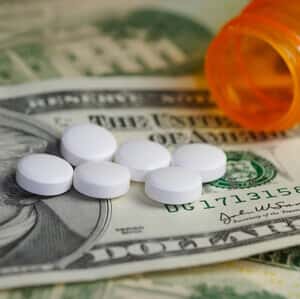
Rising prices may seem inevitable. However, the soaring cost of prescription drugs has been outpacing the general cost of inflation for years. Recent trends continue in this direction: the price of pharmaceuticals keeps going up. Under these circumstances, who wouldn’t be happy to get free samples of their prescriptions drugs? Policy analysts warn, though, that this practice helps push pharmacy bills ever higher.
What’s Wrong With Detailing and Free Samples?
Pharmaceutical marketing is one of the contributors to high drug prices. According to a new research letter, drug companies spend over $18 billion annually promoting their brand name medications directly to health professionals (JAMA Internal Medicine, online Jan. 27, 2020).
Visiting doctors to provide the “details” on new prescription drugs is a pillar of this marketing effort. The pharmaceutical sales representatives, or detailers, often make time and good will for their visits by providing lunch for the staff. They also provide free samples of new medications for patients to try.
Detailing and free samples can interfere with cost-conscious prescribing, according to the research. Some medical centers, especially academic hospitals, have banned such marketing. Nonetheless, the research demonstrates that these practices are still common in smaller clinics and more rural areas. About half of these groups reported weekly detailing visits, and almost three-fifths maintained sample closets.
The Problem With Free Samples:
If your doctor gives you free samples of a pricey new prescription, that seems like a big benefit for you. But once you are started on the drug and want (or need) to continue taking it, you may end up paying dearly. Even if your insurance covers it, the co-pay might be high. Providing such samples offers the pharmaceutical companies some cover for their pricing practices, which affect everyone.
An invited commentary in the same journal concludes that
“pharmaceutical detailing and the use of medication samples will continue to create unnecessary costs for patients and health care organizations.”
A Patient Report:
Some years ago, we heard from a patient who observed the doctor’s office. Here is the Q&A we ran in 2007 as a result:
Q. I sat in the waiting room at a local doctors’ office for hours while a relative was having tests. An amazing number of pharmaceutical reps waltzed in all day pushing dollies of samples. They waved to the front desk as they went back to restock the samples.
I also noticed a lot of food being delivered while I was there. The nurse said that pharmaceutical reps keep the staff well fed with cookies, brownies, pizza, BBQ, chicken, and the like. It seems to me there is something wrong with this picture.
A. The pharmaceutical industry spends an extraordinary amount of money promoting medications to physicians. One way to get in good with the office staff is to provide lunch. We hear that in some doctors’ offices the staff expects lunch to be provided for everyone and complains if the food doesn’t meet certain standards. These “Lunch and Learn” sessions are one way sales reps get face time with busy doctors, but the free lunches will ultimately be paid for at the pharmacy when patients pick up their prescriptions.
Learn More:
You may wish to listen to our recent podcast on this topic. Although the research discussed here had not yet been published, we spoke with Lisa Gill, health and medicine investigative reporter for Consumer Reports. It is Show 1197: How You Can Save Money on Medicines. You may also want to read our eGuide to Saving Money on Medicines.
Citations
- King AC et al, "A national survey of the frequency of drug company detailing visits and free sample closets in practices delivering primary care." JAMA Internal Medicine, online Jan. 27, 2020. doi:10.1001/jamainternmed.2019.6770

